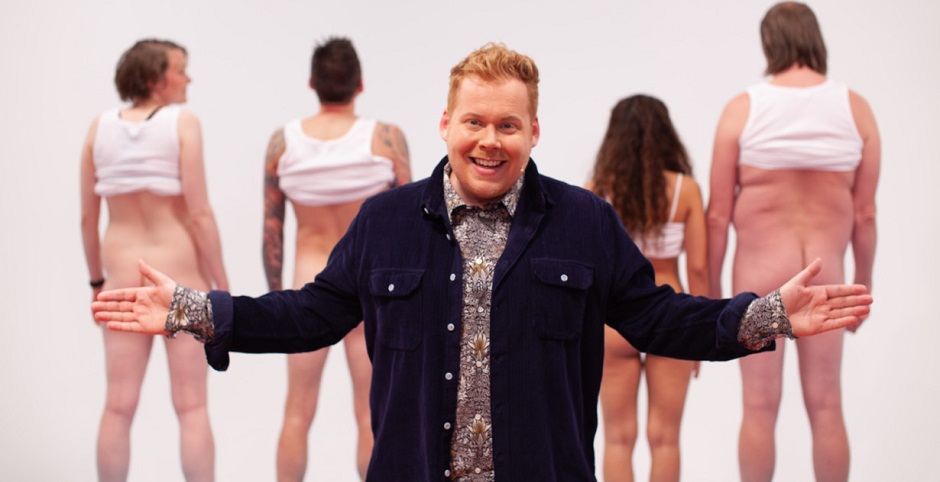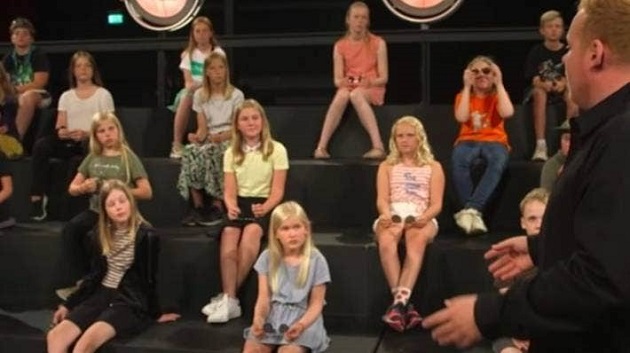‘Body positivity’ education on the Danish public television: excessive or helpful?
Adults pose naked in front of minors for a popular TV programme in Denmark. Mikael Arendt Laursen of the organisation “Church and Media” shares his impressions from a Christian perspective.
COPENHAGEN · 19 OCTOBER 2020 · 12:27 CET

A television show for children and teenagers in Denmark aims to get rid of taboos of the human body.
It is aired by the Danish public television (DR) and has gained much popularity, to the point of being awarded as the best national TV show for children of 2019.
According to its creators, “Ultra smider tøjet” – in English, ‘Throw away the clothes’ – aims to help children understand that nobody should be ashamed of how they look.
The programme is controversial because it involves adults posing nude in front of around 20-30 children aged 10-14, who then ask them “honest” questions about what they see.
“We want to show that there are bodies of all shapes and sizes”, the producers say, because “although 90% of the bodies on social media are perfect, that is not the real world”. It is all about promoting “body positivity”. But others believe these aims could have been reached with a less sexualised approach.
Neverthless, the TV show has not caused much alarm in Denmark, says Mikael Arendt Laursen, Secretary General Church and Media (KLF), an advocacy organisation that “works to make Christianity a natural part of the content of radio and television” and “fights for decent media that takes ethics and human dignity seriously”.
Arendt responded to questions of Evangelical Focus.
Q. Has there been a social debate about the implications of having adult people posing nude and speaking about human sexuality in front of minors?
A. There has been a debate, but it has not been comprehensive. A politician was on TV to tell that his children were not allowed to see the programs, but others defended the purpose of it. So the debate here in Denmark was quite manageable.
Q. What has been the reaction of Danish evangelical churches or organisations?
A. I have not seen any comments from any church leaders on this topic.
You have to understand our religious tradition here in Denmark. Danish churches do not have a tradition of interfering in public debates unless they are about the church's internal affairs. You can agree or disagree with this tradition, but this is how it is. Personally I would like church leaders to be more engaged also in matters like this.

Children ask naked adults questions about their bodies. / DR.dk
Q. Would you say such media initiatives are dangerous (contacts between nude adults and children - paedophilia, etc.) or is i just a needed sexual education in an already over-sexualized society?
A. I have seen some of the programs, and in my personal opinion they are quite harmless. The host makes the children feel comfortable and lets them ask good and relevant questions about growing up and the body of an adult. I have not seen all programs, so some of them might have crossed a line, but that is not my general perception.
Are programs like these necessary? Maybe not, but as I see them they are not that bad as many media especially abroad try to make them.
When it comes to the naked body, two cultural narratives are in play at the same time in Denmark. Danish people are very open-minded, when it comes to the human body. Danes in general don’t mind people being naked on the beach or in movies. Explicit sexual content is however by most dismissed and disregarded.
The #metoo debate and violation and abuse is a hot topic – also in Denmark. Even though Danes are proud of the direct and informal relations in the workplace and in social contexts, there is a new awakening when it comes to sexual allusions and touch.
The Danish public television has from time to time programs and features with sober information about the human body with youngsters and teenagers (above 10 years old) as the targeted audience.
Danish public and private schools have the same intention in their curricula; sober information with the intent to prepare girls and boys for puberty. However there is a discussion on how it should be carried out. In Denmark we have a nuanced debate about "Ultra smider tøjet".
However we as a Christian organization will question whether the portrayal of real men and women is better than drawings of men and women. It can be transgressive for some adults and youngsters, but not for all. A drawing can be observed as more neutral and less intimidating. Pictures and recordings of real undressed people should be used with great care.
Q. Do you know of good sex education initiatives for teenagers developed by evangelical churches or organisations?
A. I know of a website called AdamogEva.dk, which is managed by a fraction of the evangelical church. Besides that I have no knowledge of programs made on an evangelical Christian basis.
Q. Is there something else you would like to add about your work on this issue?
A. KLF, Kirke & Medier has a well-established dialogue with the Danish Broadcasting Corporation (DR), that is responsible for "Ultra smider tøjet". Thanks to our experience through many meetings and discussions with DR for almost 100 years we regard that DR has a very high ethical standard.
As a watchdog we question the ethics in specific features, documentaries, shows etc. from time to time. And KLF and DR often find common ground after some discussion. So even though we can debate on ethics, we know that DR is very concerned about how statements and programs are received.
In this case we are aware that the way the program is presented in Danish and international media is alarming, but even though we might have preferred drawings instead of real humans in the programs, we actually do not criticize the programs ourselves.
Q. How can people pray for Denmark?
A. We live in an extremely secularised country, where Christianity for the majority is culture rather than lived life.
So there is a need for a new revival in Denmark, so that people embrace faith, and it will again be the foundation of our thinking as a people. You are very welcome to pray for this.
Published in: Evangelical Focus - europe - ‘Body positivity’ education on the Danish public television: excessive or helpful?
